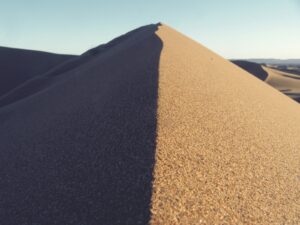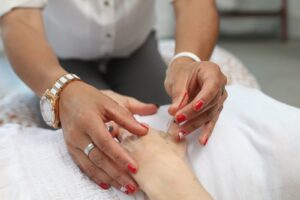Subscribe to the Newsletter
If you are interested in understanding how Traditional Chinese Medicine can improve your life sign up to my newsletter for the latest updates.

Lung Damp Phlegm describes it exactly: lots of gunge in the Lungs that you have to cough up. You might think that the Chinese, eating as all Westerners know, a perfect diet (completely lacking in chocolate, sweets or alcohol of course), would never suffer from phlegm, let alone damp phlegm.
You would be wrong. China has just as many terrible dietary habits as we do. In fact, probably more, there being a good many more people living in China (1,354 million) than in North, Central and South America combined (956 million). As for Europe, well we’ve only got around 740 million people, barely half the number of Chinese.
Lung Damp Phlegm is a syndrome in Chinese medical theory.
Have you ever sat next to someone with loose phlegm in his chest? It’s not a comfortable experience as he tries to raise the gunge!
If he is elderly, it’s worse. He never seems to quite clear it: there’s always more Lung Damp Phlegm and repeated coughing gradually weakens him.
Probably he’s been given antibiotics, which usually clears the green phlegm but leave puddles of white phlegm.
That white phlegm is often the ideal home for the next bacteria that floats in for a look around. For the bacteria, those lungs are free and warm, there are plentiful supplies of damp and lots of oxygen – perfect! – and best of all, for the bacteria there’s no need to continue the struggle to survive in that wholly alien environment outside where there’s fresh air and worse, sunlight.
To explain this Chinese medicine uses a kind of short-hand. Although the text below summarises things, for more detail click on the links.
This can arise for a number of reasons, most of which take time, sometimes years, to wreak their damage:
The Kidneys occupy an important position in Chinese medicine and a great deal of thought has gone into understanding them.
Fundamentally they look after the roots of Yin and Yang in our bodies.
Kidney Yin has a cooling, moisturising and consolidating action.
Kidney Yang is warming and, in particular, warms Spleen Yang.
So if Kidney Yang is weak, Spleen Yang will also be weak. Both are aspects of Yang deficiency. Deficient yang then allows phlegm to build up in the Lungs and you get Lung Damp Phlegm!
How do you get Kidney Yang weakness? This is a big subject but it boils down to excess strain on your system such as:

© Sergey Khakimullin
Dreamstime.com
The above symptoms are common to this syndrome.
In addition to the above Lung Damp Phlegm signs, you may get, depending on other factors, symptoms such as the following, which are not part of the main syndrome picture but may accompany it:
When your lungs are all stuffed up like this, you become more susceptible to Qi stagnation, a complication you certainly won’t welcome.!
Many of these symptoms, especially those of the main Lung Damp Phlegm syndrome above, occur because Phlegm blocks the proper flow of Energy. It stops Lung energy descending so you cough. It prevents your Stomach energy descending so you feel nauseous. Phlegm is said to get to the head, making you confused and heavy-headed and sometimes dizzy.
Where does Phlegm come from? In Chinese medicine it comes mainly from the Spleen and is said to be stored in the Lungs. But there’s much more than that to it. Read what people say about my book on the subject.
Hence all the coughing in this syndrome.
Lung Damp Phlegm doesn’t happen suddenly. It arrives gradually, preceded by months if not years of eating foods that have weakened the Spleen. Typically foods eaten have been too rich, or greasy, too cold or raw, with too much dairy food in them and too many sweeteners, including sugar, honey and artificial sweeteners.
People with this problem probably like sweets, chocolates, sugary treats and puddings. Just occasionally you get people who claim, hand on heart, that they never eat such garbage, but who never eat warm food either, insisting that all their food is fresh, raw, uncooked. For them, especially in winter, this may be too cold for their Spleen energy to handle.
Any attack on the system from outside, such as from a bug or virus, or from what in Chinese medicine is called Wind-Heat or Wind-Cold, will block the flow of Qi along the channels.
Such disruption prevents the Spleen and Lung from doing their jobs properly leading to build-up of damp and phlegm.
That gives you Lung Damp Phlegm.
Easy!
Well, not so easy. Damp and Phlegm are two big ‘heavies’ that can take a lot of shifting. While the Spleen’s and Lungs’ energies are both labouring in the presence of Damp and Phlegm, they can’t get it together to clear things up.
So take proper rest, and avoid foods that make it worse. The usual advice is not to eat dairy food, sweet food, or raw or chilled food or drink. Instead eat foods that are warm, and add a little fresh ginger root to cooking. Nutrition is a big subject, to a great extend under our own control, and can make a huge difference to health!
(NB Proper rest may mean more time in bed, or napping through the day, or lying down when you would otherwise be working. Recovering energy takes time!)
If you are young and vigorous, that might be enough, especially if you can live or stay somewhere neither damp nor cold while you recover. A warm climate helps.
If you are older and less vigorous, you’ll almost certainly take a long time to recover and your energy may remain low for ages.
Chinese medicine, by carefully diagnosing the syndrome into its constituent parts, offers clear ways to treat it. That doesn’t mean overnight cure! But when I’ve treated it, it usually does go quite fast, with the correct treatment. Acupuncture is a powerful method.
Chinese Herbal medicine can be excellent for this too.
Other pages you may like:

Stay in Touch!
No spam, only notifications about new articles and updates.

Book a Video consultation if you want to know more about your symptoms

This Introductory Chinese medicine course introduces you to the amazing thinking behind this ancient medicine, now increasingly in demand.

The Scottish College for Chinese medicine provides introductory courses for all, explaining Chinese medicine and its cultural background.

Master Tung’s acupuncture is a hidden treasure, lost to China but recovered in Taiwan from where it spread round the world.

Knee pain has five main causes. It’s certainly worth trying acupuncture before you resort to surgery!
Subscribe to the Newsletter
If you are interested in understanding how Traditional Chinese Medicine can improve your life sign up to my newsletter for the latest updates.
Subscribe to the Newsletter
If you are interested in understanding how Traditional Chinese Medicine can improve your life sign up to my newsletter for the latest updates.